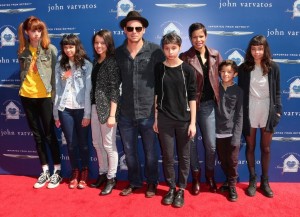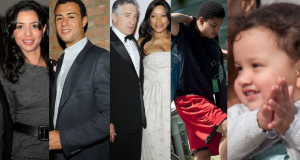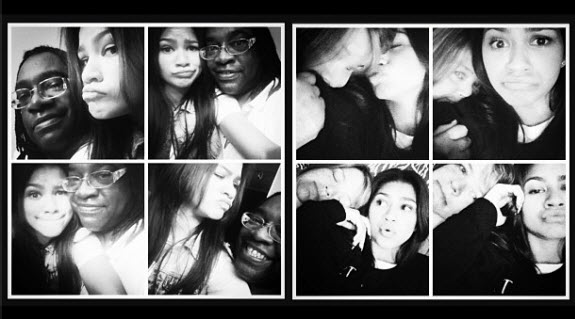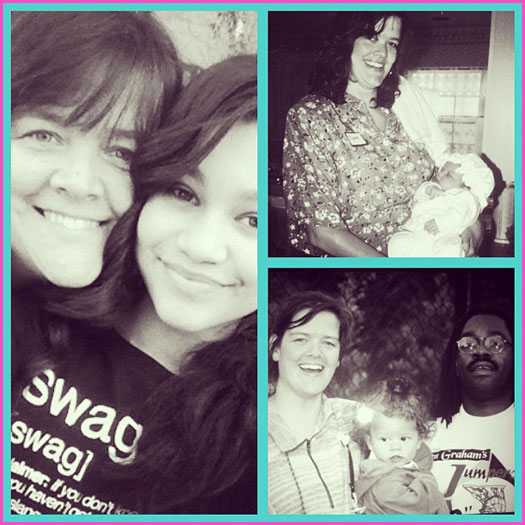Since I last posted (where does the time go!?) I’ve been thinking about how the opposite of depressed is not happy. Because depression is not sadness. I fully realized this when I found myself experiencing great sadness over the fact that I was not able to witness a very, very dear friend’s wedding. I was so, so sad about it. I cried. Then I stopped crying. While I was still aware of the sadness around this though the tears were done, I noticed that I had been able to allow the feeling to pass through me and then I found myself back at peace in the present moment. (Yes, I have been meditating. More on that in some other post.) It was in that present space that I had a lovely aha moment in which for the first time I clearly felt the difference between sad and depressed. I had just allowed myself to experience my sadness without it causing great anxiety and/or influencing my every thought and my outlook on life in general. And this was awesome because I spent a lot of years trying to avoid my feelings because they were overwhelming and I simply had no earthly idea what to do with them.
 So I resisted them. I depressed (def: having been pushed or forced down) them. The awareness of that internal shift made me truly happy, as in pleased and content, for this is a sign that my efforts to nourish and balance my mind, body, and spirit have been somewhat successful (with the help of my therapist(s)) in calming my nervous system, and in redirecting and reconnecting pathways in my brain that had habitually spun in anxious patterns of negative expectation so that I can experience my feelings without attaching my identity to them or getting carried away by them. So that I can truly live.
After that mildly profound experience, I came across the blog post below for which Junior Seau’s death was the catalyst. Junior Seau committed suicide, but was not known to be suffering from depression at the time. I am not implying that depression and suicide go hand in hand, nor am I making any statement about race. I simply like the way Miriam Mogilevsky differentiates between sadness and depression. As I’ve contemplated my own depression, the part of me that is still resistant to it’s existence will every now and then pipe up with a, “But I’m so happy a lot of the time.” And it’s true. Sometimes I am so happy. Many times. And sometimes I am not. But, whatever, because happy is just an adjective (a word or phrase naming an attribute, added to or grammatically related to a noun to modify or describe it. Happy: feeling or showing pleasure (satisfaction/enjoyment) or contentment. Sad: Feeling or showing sorrow: unhappy.I believe that I can be not depressed forever. If not forever, for most of it I hope. Speaking of which, to me depression most plainly described is a severe lack of hope. I know that one can experience a moment of happy in the midst of the hopelessness of depression. Likewise, without depression, happyness is not guaranteed. Sadness will enter. After all we are talking about the human experience here. There is no way that I will always, 100% of the time, experience pleasure, enjoyment, contentment, or satisfaction. I don’t even want that. That would lead to complacency and boredom. I do crave peace, however. That is my goal. I want to always know the way back to the peace of the present moment that I find in the center of my heart. When I can allow myself to feel that. That’s huge. Peace in the midst of sorrow and joy and all the rest of it. I can only experience happiness. I don’t think it can or should be held onto. I can actually be peaceful though. That is a state of being that is sustainable and maintainable. That’s what I’m working toward.
So I resisted them. I depressed (def: having been pushed or forced down) them. The awareness of that internal shift made me truly happy, as in pleased and content, for this is a sign that my efforts to nourish and balance my mind, body, and spirit have been somewhat successful (with the help of my therapist(s)) in calming my nervous system, and in redirecting and reconnecting pathways in my brain that had habitually spun in anxious patterns of negative expectation so that I can experience my feelings without attaching my identity to them or getting carried away by them. So that I can truly live.
After that mildly profound experience, I came across the blog post below for which Junior Seau’s death was the catalyst. Junior Seau committed suicide, but was not known to be suffering from depression at the time. I am not implying that depression and suicide go hand in hand, nor am I making any statement about race. I simply like the way Miriam Mogilevsky differentiates between sadness and depression. As I’ve contemplated my own depression, the part of me that is still resistant to it’s existence will every now and then pipe up with a, “But I’m so happy a lot of the time.” And it’s true. Sometimes I am so happy. Many times. And sometimes I am not. But, whatever, because happy is just an adjective (a word or phrase naming an attribute, added to or grammatically related to a noun to modify or describe it. Happy: feeling or showing pleasure (satisfaction/enjoyment) or contentment. Sad: Feeling or showing sorrow: unhappy.I believe that I can be not depressed forever. If not forever, for most of it I hope. Speaking of which, to me depression most plainly described is a severe lack of hope. I know that one can experience a moment of happy in the midst of the hopelessness of depression. Likewise, without depression, happyness is not guaranteed. Sadness will enter. After all we are talking about the human experience here. There is no way that I will always, 100% of the time, experience pleasure, enjoyment, contentment, or satisfaction. I don’t even want that. That would lead to complacency and boredom. I do crave peace, however. That is my goal. I want to always know the way back to the peace of the present moment that I find in the center of my heart. When I can allow myself to feel that. That’s huge. Peace in the midst of sorrow and joy and all the rest of it. I can only experience happiness. I don’t think it can or should be held onto. I can actually be peaceful though. That is a state of being that is sustainable and maintainable. That’s what I’m working toward.

Peace:
-freedom from disturbance; quiet and tranquility
-mental calm, serenity
-freedom from dispute or dissension between individuals or groups (now we’re getting loser to race)
DEPRESSION IS NOT SADNESS: JUNIOR SEAU AND PUBLIC DISCOURSE ON MENTAL ILLNESS
A few days ago I came across the story of Junior Seau, an NFL linebacker who committed suicide on May 2 (2012). He shot himself in the chest and was found in his home by his girlfriend. Although little is known of Seau’s mental health leading up to his death, he had apparently suffered from insomnia for the last seven years of his life.
Sportswriter Chris McCosky wrote a beautiful column in the Detroit News about Seau’s death and continuing ignorance about depression and suicide. In the column, McCosky shares his own experiences with depression and suicidal thoughts and laments how difficult it is to explain them to people. He notes, as I’ve noted before, that one common reaction that non-depressed people have is to wonder what the hell we have to be so sad about. He writes, “It’s almost impossible to talk about it to regular people (bosses, spouses, friends). They can’t fathom how somebody in good physical health, with a good job, with kids who love them, who seems relatively normal on the outside, can be terminally unhappy.”
The unbearable frequency at which McCosky and I and probably everyone else who tries to talk about depression get this response could be a testament to the fact the most visible symptom of depression is usually sadness. So that’s the one people latch on to: “What do you have to be so sad about?” “Cheer up!” “You have to decide to be happy!”
Because of the sheer obviousness of our sadness, we’re often forced to try to use it to describe depression. We say that we’re just extremely sad, or unhealthily sad, or adifferent kind of sad. It’s sadness that never goes away like sadness is supposed to. It’s sadness that’s out of proportion to the troubles that we face in our lives. It’s sadness that we can’t stop thinking about. For those of us with bipolar or cyclothymic disorder, it’s sadness that comes and goes much too quickly.
The truth is that sadness actually has very little to do with depression, except that it is one of its many possible symptoms.
Based on the diagnostic criteria for depression, you don’t even need to be chronically sad to be considered “depressed.” Anhedonia, which means losing the ability to feel pleasure from things that you used to enjoy, could be present instead. Under the formal DSM-IV definition, you must have at least five of nine possible symptoms to have major depression–and one of the five must be either depressed mood or anhedonia–and only one of those symptoms involves sadness. (If you so some very basic math, you will notice that this means that two people, both of whom officially have major depression, might only have one symptom in common. Weird, huh?)
So, even if your particular depression does include sadness, it’ll only be one of many other symptoms. The others might be much more painful and salient for you than the sadness is. Some people can’t sleep, others gain weight, some think constantly about death, others can’t concentrate or remember anything. Many lose interest in sex, or food, or both. Almost everyone, it seems, experiences a crushing fatigue in which your limbs feel like stone and no amount of sleep ever helps. Then there are headaches, stomachaches, and so on.
So, depression doesn’t necessarily mean sadness to us. (And a gentle reminder to non-depressed folks: being sad doesn’t mean you’re “depressed,” either.)
Depression is not sadness; it’s an illness that often, though not always, involves sadness. No amount of happy things will make a depressed person spontaneously recover, and, usually, no amount of sad things will make a well-adjusted person with good mental health suddenly develop depression. (Grief, of course, is another matter.) And sadness, on its own, does not cause suicide.
We need to start talking about mood disorders as disorders, not as emotional states. McCosky writes:
Junior Seau wasn’t sad when he pointed that gun to his chest. He wasn’t being a coward. He wasn’t being selfish. He was sick. I wasn’t sad when I thought about swerving into on-coming traffic on Pontiac Trail some 20 years ago. I was sick.

Junior Seau one month prior to his death
What he’s saying is that people don’t kill themselves because they’re sad. They kill themselves because they have an illness.
There is a tendency, I think, to assume that people are depressed because they are sad. A better way to look at it is that people are sad because they are depressed. That’s why, even if we could “turn that frown upside down!” and “just look on the sunny side!” for your benefit, it would do absolutely no good. The depression would still be there, but in a different form.
Junior Seau did not leave a suicide note, so only God knows what he was thinking when he died. I would guess, though, that he was thinking about much more than just being sad.












































